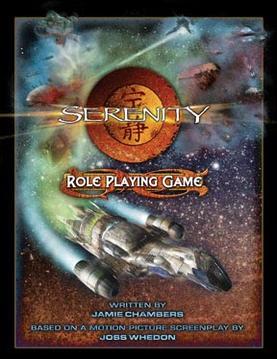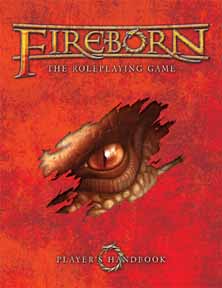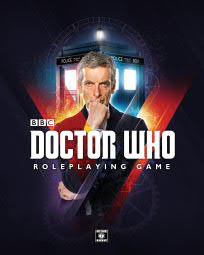
Fate is a generic role-playing game system based on the Fudge gaming system. It has no fixed setting, traits, or genre and is customizable. It is designed to offer minimal obstruction to role-playing by assuming players want to make fewer dice rolls.
In some role-playing game (RPG) systems, the dice pool is the number of dice that a player is allowed to roll when attempting to perform a certain action.

The Serenity Role Playing Game is a science fiction role-playing game released in 2005 and set in the universe of the movie Serenity. It was produced by Margaret Weis Productions, Ltd, and its mechanics were the first iteration of the Cortex System. It won an Origins Award for best RPG in 2005 and Margaret Weis' license came to an end on January 31, 2011.
Margaret Weis Productions, Ltd. is a games publisher located in Williams Bay, Wisconsin, United States and founded in 2004 after Margaret Weis and Don Perrin, the two founders of Sovereign Press, divorced.
In tabletop role-playing games, a plot point is a resource possessed by a player which can be spent to alter the plot of the game. The name is a pun on the TV and film term plot point.

The Supernatural Role Playing Game is a role-playing game by Margaret Weis Productions that was released in 2009. It is based on the television series Supernatural and was the final game to use the Cortex System.
Evil Hat Productions is a company that produces role-playing games and other tabletop games. Chief among them is the free indie RPG, Fate, which has won numerous awards.

Fireborn is a cross-genre role-playing game incorporating elements of urban fantasy and high fantasy.
Now most commonly referred to as "Cortex Classic," the Cortex System is a generic RPG system based on the Sovereign Stone role-playing game system,, and was developed by Margaret Weis Productions, Ltd for the Serenity Role Playing Game. It was subsequently used for their licensed Battlestar Galactica and Supernatural RPGs, and brought out as a stand-alone system in the Cortex System Role Playing Game book. Serenity, using the Cortex System, was the 2005 Origins Award Gamer's Choice Role Playing Game of the Year.

The Doctor Who Roleplaying Game, formerly Doctor Who: Adventures in Time And Space is a role-playing game published by UK-based Cubicle 7 Entertainment. It is based on the BBC science fiction television programme Doctor Who, and allows roleplayers to adopt the role of characters from that fictional universe.
The Star Wars Roleplaying Game is a tabletop role-playing game set in the Star Wars universe, first published by Fantasy Flight Games in 2012. It consists of different standalone cross-compatible games where each one is a separate themed experience. The sourcebooks support games set from the Clone Wars era to the original Star Wars trilogy era; there is limited support for the Star Wars sequel trilogy era. Since 2020, the game line has been maintained by Asmodee's subsidiary Edge Studio.

Marvel Heroic Roleplaying is the fourth role-playing game set in the Marvel Universe published by Margaret Weis Productions under license from Marvel Comics. It uses the Cortex Plus system. The first volume was published in early 2012. In early 2013, Margaret Weis Productions announced that they would not be renewing their license and publication ceased.
Free RPG Day is an annual promotional event by the Tabletop role-playing game industry. The event rules are fairly simple: participating publishers provide special free copies of games to participating game stores; the game store agrees to provide one free game to any person who requests a free game on Free RPG Day.
Rob Donoghue is a game designer who has worked primarily on role-playing games. Together with Fred Hicks he created the Fate system and has been designer or lead designer of numerous award-winning role playing games. He was a lead designer of the role-playing games Spirit of the Century and a designer of The Dresden Files Roleplaying Game, and has also worked closely with Cam Banks on the Cortex Plus games, a lead designer for Leverage: The Roleplaying Game, and as a designer for Marvel Heroic Roleplaying. He has also contributed to Dungeons & Dragons 4th edition publications.
The Cortex Plus System is a toolkit RPG system that evolved from Margaret Weis Productions, Ltd's Cortex System. It has been used for four published games and one published preview to date, and the design principles are in the Cortex Plus Hacker's Guide, a book of advice in how to create new games using Cortex Plus, and list of new games produced via Kickstarter. According to the Hacker's Guide there are three basic 'flavors' of Cortex Plus; Action, Drama, and Heroic.

The Smallville Roleplaying Game is a superhero-themed role-playing game published in 2010 by Margaret Weis Productions, and is set in the universe of the television series Smallville. The Smallville Roleplaying Game was the first of the new role-playing games from Margaret Weis Productions to utilize their new Cortex Plus system. The Smallville Roleplaying Game was designed by the game's line developer Cam Banks and indie role-playing game publisher Josh Roby.
Cam Banks is a game designer known for his work on the Cortex System line of roleplaying games as lead designer for Marvel Heroic Roleplaying, and the Big Damn Heroes Handbook supplement to the Serenity Role Playing Game, among other titles. He is the Cortex Creative Director for Fandom Tabletop, the publishers of Cortex Prime.

The Battlestar Galactica Role Playing Game is a role-playing game published by Margaret Weis Productions in 2007, based on the Battlestar Galactica franchise.

The Firefly Role-Playing Game is a science fiction role-playing game released in 2014, written by Monica Valentinelli and set in the universe of the Joss Whedon television show Firefly. It was produced by Margaret Weis Productions, Ltd, and uses the "Cortex Action" variant of Margaret Weis Production's proprietary Cortex Plus game system.
The Cortex System is a collection of related roleplaying games. Its most recent iteration, Cortex Prime, was designed by Cam Banks and published by Fandom Tabletop. Prior versions appeared in the licensed roleplaying games published by Margaret Weis Productions, where it was used as the house system. Cortex is an adaptable game system focusing on characterization and story development.









